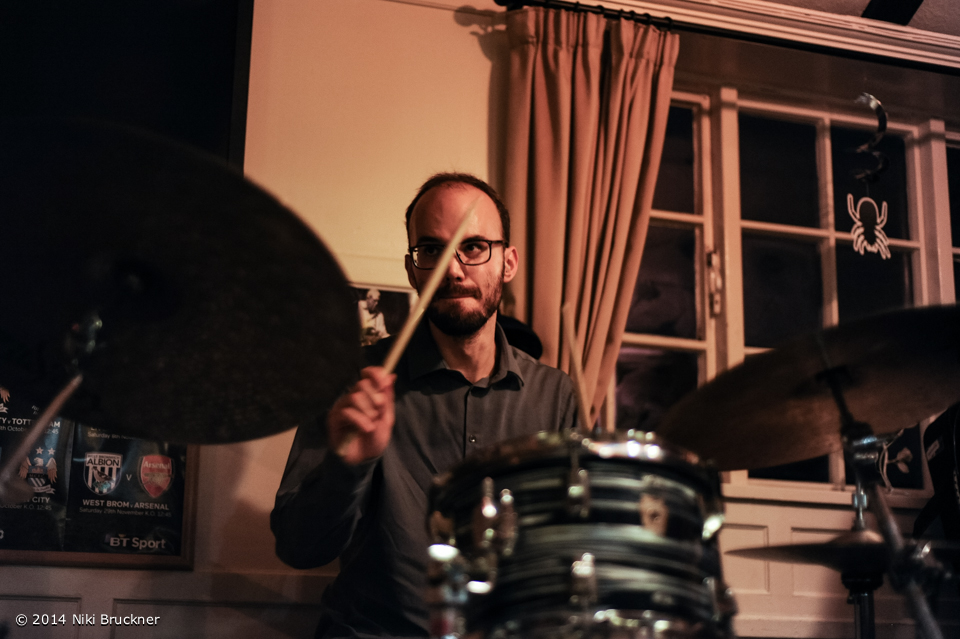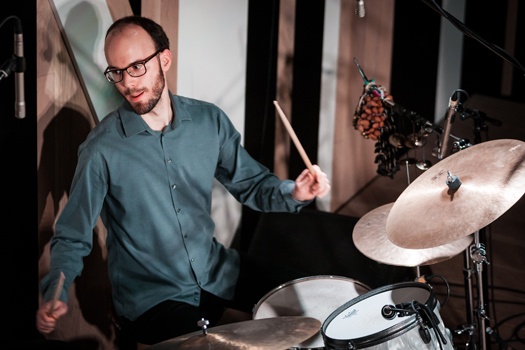Jazz interview with jazz drummer and composer Marton Juhasz. An interview by email in writing.
JazzBluesNews.Space: – First let’s start with where you grew up, and what got you interested in music?
Marton Juhasz: – I was born and raised in the suburbs of Budapest, Hungary. There are no other musicians in my family, so I’m not totally sure what captured my interest initially. I remember that I always had a very strong emotional response to the music I was hearing – I was feeling the depth, the energy and the movement in a very intense way.
JBN.S: – What got you interested in picking up the drums? What teacher or teachers helped you progress to the level of playing you have today? What made you choose the drums?
MJ: – My parents would take me to see some live music and I would always be watching the drummer. I really liked the way the drummer moved to make a sound – it was so… direct. This really appealed to me. My parents were supportive of my interest and they took me to a teacher learn classical percussion when I was 11. Mostly snare drum and some orchestral percussion – it was a lot of fun! After some years I started to play the drumset – I was very lucky to have had a teacher who approached everything from a musical perspective. He would make me a tape every week that I could listen to – a variety of styles, but all really great music! After high school I moved to London for a one year course in popular music and then I was lucky enough to be accepted and be able to study at Berklee College of Music. That was a real game changer as I was surrounded by very talented people and was quickly put in my place. In a way, that was when I really started to push myself to work harder, but it was only years of frustration later that I actually saw the results. I had a lot of great teachers during my time in Boston but the person who stands out is Hal Crook. I had ensemble classes with him and he was the person who really made think of playing drums non-drumistically. Meaning that you approach the music from a holistic viewpoint and not through your instrument.
JBN.S: – How did your sound evolve over time? What did you do to find and develop your sound?
MJ: – For me this is an ongoing process. But the essential idea is to try to drop all preconceptions about what should sound good (because someone famous / an authority figure / an advertisement / a top 10 list said so), and learn to use your own ears to make decisions. Then you are free to explore music and create sounds that you are happy with.
JBN.S: – What practice routine or exercise have you developed to maintain and improve your current musical ability especially pertaining to rhythm?
MJ: – Recently I’ve spent a lot of time trying to create exercises for myself that are very ‘information dense’. For example, if I want to practice going from and to all the different pieces of the drumset, can I find a way to write an exercise that is as short as possible but has all the transitions in it? I’ve developed this idea quite extensively and I’m planning to publish these exercises in a series of books called ‘Tradition & Abstraction’.
JBN.S: – Which harmonies and harmonic patterns do you prefer now? You’re playing is very sensitive, deft, it’s smooth, and I’d say you drift more toward harmony than dissonance. There is some dissonance there, but you use it judiciously. Is that a conscious decision or again, is it just an output of what goes in?
MJ: – When I write music I always try to do it from a non-technical perspective. I am trying to cultivate a specific emotion / feeling / atmosphere and I search for the harmonies and melodies that I find to be the closest match to what I imagine internally.
JBN.S: – How to prevent disparate influences from coloring what you’re doing?
MJ: – This is a real issue – I find that I get swayed very easily by music that surrounds me. So if I know I want to write I try to reserve a period where I can focus on the project exclusively. Even if it’s just for a week.
JBN.S: – What’s the balance in music between intellect and soul?
MJ: – I’m more interested in the evocative power of music than the intellectual complexity that can be achieved. But I love analysis and abstraction – they are powerful tools, just not the end goal for me.
JBN.S: – There’s a two-way relationship between audience and artist; you’re okay with giving the people what they want?
MJ: – The question to me is: in this specific situation, what is the function of the music? Is it for entertainment? For dancing? Am I supposed to make some kind of artistic value statement? Is this a situation where the music can have a therapeutic effect? I think these are all totally valid reasons to play – so, yes, in a basic sense I’m happy with giving people what they want.
JBN.S: – Please any memories from gigs, jams, open acts and studio sessions which you’d like to share with us?
MJ: – Relating this question back to the previous one: I am always struck by the special energy of a live concert – it is really nothing like playing alone or rehearsing in a practice room. I recently played at a memorial service – it was a very fulfilling musical experience because in a way, the event primed the listeners to look for some kind of release in the music.
JBN.S: – How can we get young people interested in jazz when most of the standard tunes are half a century old?
MJ: – I think there will always be a segment of the population who is drawn to the kind of feeling that you get from hearing jazz. If someone has any curiosity towards music they will eventually discover the style and if it speaks to them they will be compelled to explore more. But this process is of course a bit more difficult these days, as the airways and the internet are crowded with music that appeals to an ever shorter attention span. And if that is all someone hears, then listening to jazz will probably provoke anxiety and confusion.
JBN.S: – John Coltrane said that music was his spirit. How do you understand the spirit and the meaning of life?
MJ: – I try to think about these questions outside music and then adjust my approach to art so it’s coherent with my overall philosophy. In my current view art at it’s most useful, is a tool to transmute the traumas that are a part of even the most privileged of human existences. It is a way to curb transference – the subconscious passing down of conflict and violence to the next generation. On a more physical level, it’s been shown that experience shapes the genetic material of a person. So if I can leave an audience with an especially comforting feeling, then I have contributed to their long-term physical wellbeing.
JBN.S: – If you could change one thing in the musical world and it would become a reality, what would that be?
MJ: – My idea is that musicians and audiences alike would be better off if there were less concerts overall. Musicians could get paid more to play as it would be easier to promote less concerts and an interested audience would be easier to draw to select events. And since musicians would have more time to prepare (because they would not be forced to take as many gigs as possible just to survive) the audience would get a much better show. The current setup – in which tired, worn out musicians are playing for sometimes very little money and have no real incentive to put on a fantastic show – which often leaves audiences disappointed and less likely to go to any more jazz concerts – is detrimental to the genre.
JBN.S: – Who do you find yourself listening to these days?
MJ: – Lately I’ve been revisiting Brian Blade’s Mama Rosa album.
JBN.S: – What is the message you choose to bring through your music?
MJ: – I’m not sure if it’s possible to embed a concrete message into instrumental music – but perhaps what I’m trying to project is that the creation of something very individual is actually a testament to the fact that we are all connected and part of a whole.
JBN.S: – Let’s take a trip with a time machine, so where and why would you really wanna go?
MJ: – Oh I would love to visit the second half of the 1960s and hear all the amazing music played live!
JBN.S: – I have been asking you so far, now may I have a question from yourself…
MJ: – What are your plans for the upcoming year? I am really looking forward to take …
JBN.S: – Thank you for answers, but my question is that you had to ask me your question and not to yourself 🙂
JBN.S: – So putting that all together, how are you able to harness that now?
MJ: – I am happy that I finally found a place – psychologically speaking – where I am able to create without too much self-doubt or anxiety. I’m planning to write and record lot of music in the coming years and I hope that many people will find enjoyment in my work.
Interview by Simon Sargsyan







More Stories
Interview with Janis Siegel of The Manhattan Transfer: Jazz, being a more refined, interpreted form of music
CD review: George Benson – Dreams Do Come True: When George Benson Meets Robert Farnon – 2024: Video, CD cover
The band was tight as ever. The Warren Haynes Band cuts loose: Video, Photos